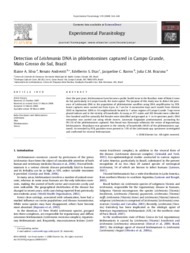Detection of Leishmania DNA in phlebotomines captured in Campo Grande, Mato Grosso do Sul, Brazil.
Detection of Leishmania DNA in phlebotomines captured in Campo Grande, Mato Grosso do Sul, Brazil.
Author(s): SILVA, E. A.; ANDREOTTI, R.; DIAS, E. S.; BARROS, J. C.; BRAZUNA, J. C. M.
Summary: Over the past years, leishmaniases have become a public health issue in the Brazilian state of Mato Grosso do Sul, particularly in Campo Grande, the state capital. The purpose of this study was to detect the presence of Leishmania DNA in the population of phlebotomine sandflies using DNA amplification by PCR. Insect captures were carried out from 4 pm. to 7 am for 4 consecutive days each month from October 2005 to September 2006 in 16 neighborhoods located in 7 urban regions of Campo Grande. Traps were placed indoors and in the vicinity of households. As many as 971 males and 203 females were collected. One hundred and five naturally fed females were identified and grouped as 1- to 4-specimen pools. DNA extraction was carried out using whole insects. Lutzomyia longipalpis predominated, accounting for 99.15% of the phlebotomines captured. Also found was Nyssomyia whitmani, the vector of tegumentary leishmaniasis. Abundance was greatest in the vicinity of households (69.8% of the phlebotomines captured). As revealed by PCR, parasites were present in 1.9% of the Leishmania spp. specimens investigated and confirmed for visceral leishmaniasis.
Publication year: 2008
Types of publication: Journal article
Unit: Embrapa Beef Cattle
Keywords: Brasil, Campo Grande, DNA, Leishmania, Leishmaniose, Mato Grosso do Sul, Sanidade Animal
Observation
Some of Embrapa's publications are published as ePub files. To read them, use or download one of the following free software options to your computer or mobile device. Android: Google Play Books; IOS: iBooks; Windows and Linux: Calibre.
Access other publications
Access the Agricultural Research Database (BDPA) to consult Embrapa's full library collection and records.
Visit Embrapa Bookstore to purchase books and other publications sold by Embrapa.

